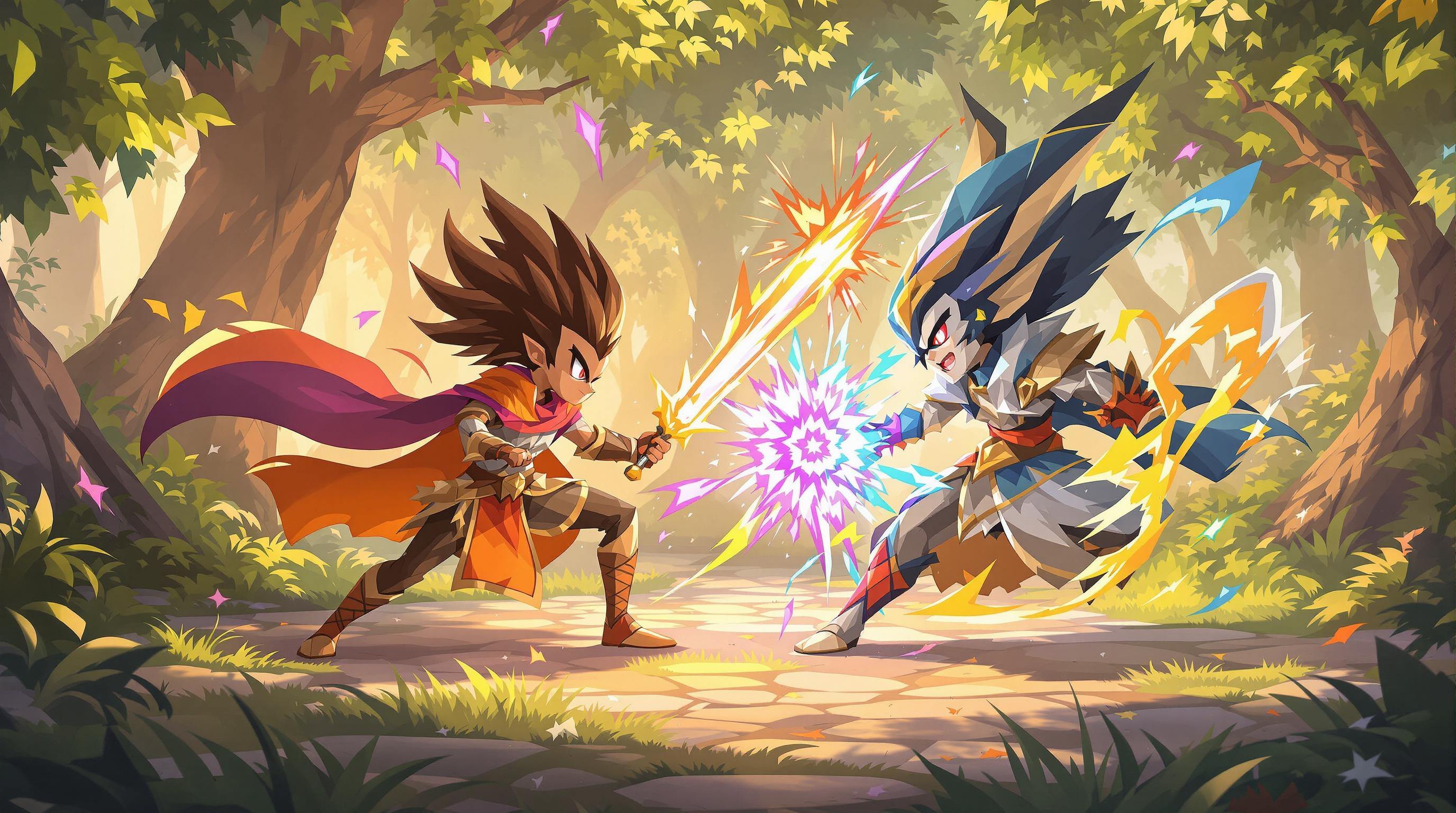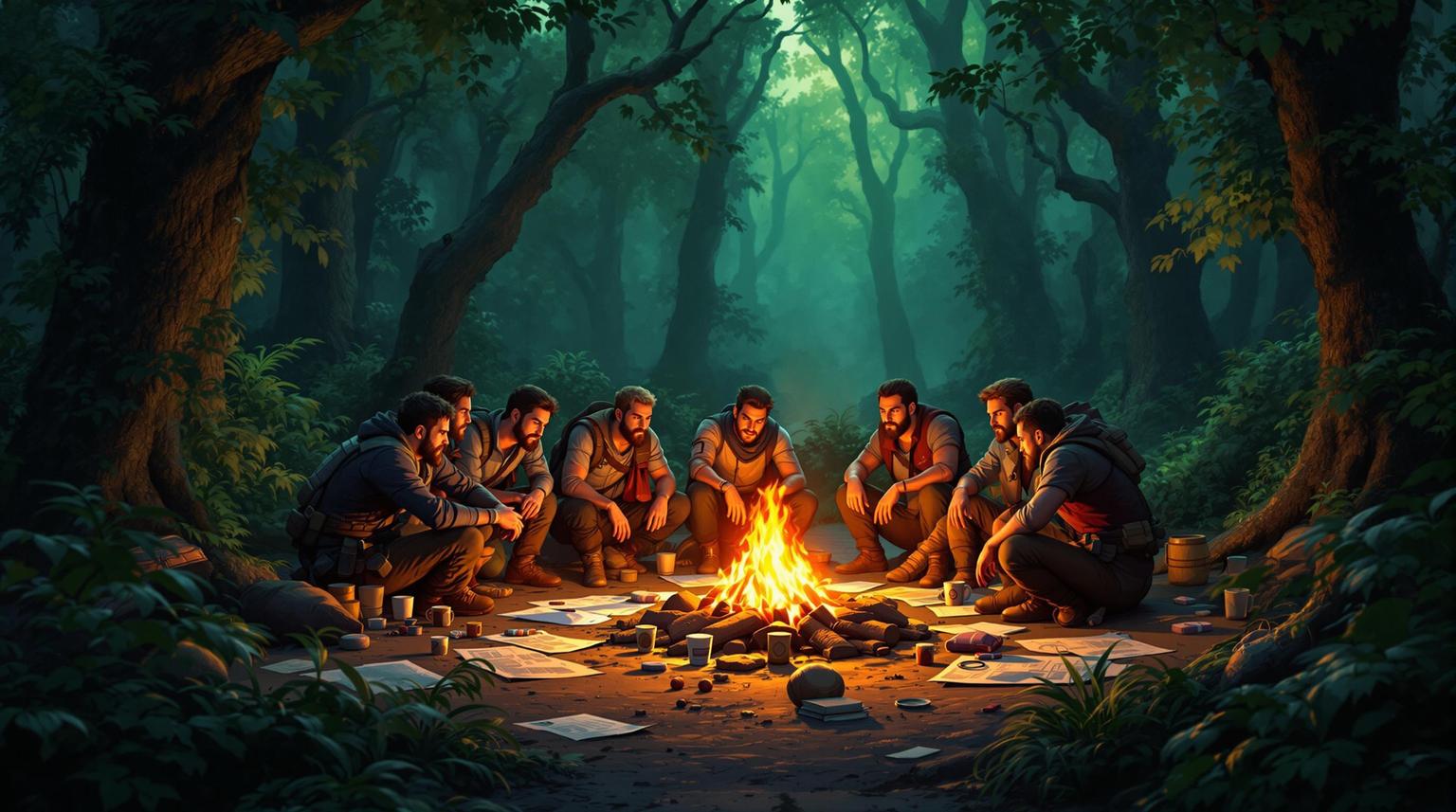When creating characters for tabletop RPGs, you’ll often choose between point-buy systems and random generation methods. Each offers a unique approach to building your character:
- Point-Buy: You control how points are distributed among abilities, allowing for balanced and tailored characters. It’s great for those who enjoy planning and optimization.
- Random Generation: Dice rolls determine your stats, introducing unpredictability and encouraging creativity. Perfect for players who love surprises.
Quick Comparison:
| Feature | Point-Buy | Random Generation |
|---|---|---|
| Control | Full control over stats | Limited, based on dice rolls |
| Balance | Ensures equal power among players | Can result in imbalanced stats |
| Creation Time | Slower, requires planning | Faster, minimal decision-making |
| Roleplay Potential | Aligns with your character vision | Encourages adapting to randomness |
| Complexity | Requires system knowledge | Simple and straightforward |
Choose point-buy for fairness and strategy, or random generation for spontaneity and discovery. Your choice depends on your group’s preferences and the type of campaign you’re playing.
BEST Way to Get Ability Scores for D&D - Comparing the 3 methods!
How Point-Buy and Random Generation Work
Each character creation system operates with its own unique mechanics. Understanding these approaches is key to appreciating their differences and how they shape gameplay.
Point-Buy System Explained
The point-buy system gives players a set number of points to distribute among their character's abilities. For example, in Dungeons & Dragons 5th Edition, players start with 27 points to allocate across six ability scores. Each ability begins with a base score of 8, and players "spend" points to increase these scores based on a specific cost structure.
The cost increases as scores rise. For instance, raising an ability from 8 to 13 requires 5 points in total, but pushing it from 13 to 15 costs an additional 4 points. This scaling cost system ensures that players can’t max out one ability without sacrificing others.
| Ability Score | Point Buy Cost |
|---|---|
| 8 | 0 |
| 9 | 1 |
| 10 | 2 |
| 11 | 3 |
| 12 | 4 |
| 13 | 5 |
| 14 | 7 |
| 15 | 9 |
Players cannot reduce any ability below 8, and the maximum score achievable through point-buy is 15, excluding bonuses from racial or background traits. Once all points are allocated, these bonuses are added to finalize the character's ability modifiers.
This system rewards careful planning and optimization. Players must decide whether to focus on creating a specialist with one or two standout abilities or aim for a more balanced character with moderate stats. Some dungeon masters tweak the standard 27-point system, offering more points for high-powered campaigns or fewer for grittier, low-power adventures.
In contrast, random generation takes a completely different approach, relying on the element of chance.
Random Generation System Explained
Unlike the point-buy system, random generation introduces unpredictability into character creation. This method uses dice rolls to determine ability scores, making the process more reliant on luck. Typically, players roll four six-sided dice, drop the lowest roll, and add the remaining three together. This process is repeated six times to generate scores for all abilities, resulting in unexpected and varied outcomes.
Christopher D. Hartpence from Francis Marion University highlights the philosophy behind this method:
"If your goal is to allow players to DISCOVER their character (rather than come up with a character concept first, and then build it), then rolling stats is the method you want to use"
Some systems take randomness even further, incorporating it into lifepaths, skills, or even character survival. For example, Star Trek Adventures features a hybrid approach where players encounter random lifepath events but can choose to accept or reject certain aspects, such as their upbringing, which then influences their abilities.
The level of randomness varies widely between systems. Some games randomize everything, including abilities, equipment, and backstories, while others focus solely on ability scores.
Random generation is often quicker and simpler than point-buy. It eliminates the need for deep system knowledge and avoids the optimization "mini-game" that some players dislike. However, it can lead to significant disparities between characters. One player might roll incredible stats, while another ends up with less-than-stellar abilities, creating potential imbalances within the party.
Mechanical Differences Between Systems
Point-buy and random systems offer unique approaches to character creation, each shaping how players engage with their characters and the game itself.
Player Control and Character Customization
Point-buy systems give players full control over character development, letting them allocate points to emphasize specific abilities. This approach allows characters to align closely with particular playstyles or backstories. For example, someone envisioning a scholarly wizard can focus on Intelligence, while a bard with a silver tongue might prioritize Charisma. Some point-buy systems even reward players with extra points for incorporating flaws, adding layers to roleplaying opportunities.
On the other hand, random generation relies on dice rolls to determine ability scores, meaning players must adapt their character concepts to the results. While this can inspire creative and unexpected builds, it can also disrupt plans if the rolls don’t align with the player’s vision. These differences in customization also influence how quickly characters can be created.
Creation Time and Process Complexity
The time and effort required to create a character differ significantly between these systems. Random generation is quick and straightforward - roll the dice, jot down the results, and you’re ready to go. This simplicity appeals to players eager to jump into the action with minimal preparation.
"The value I see is speed of character creation and ease of character creation. I have little interest in games where character creation takes longer than 15 or 20 minutes or that requires a lot of system knowledge (let alone system mastery) on the part of the player to create a competent character."
- RandallS
For some, the immediate readiness of random generation is a major draw:
"I actually prefer random. I'm here to play and not so much here to prep. Give me a sheet ready to go and game on. My investable time is mostly at the table so I like games now that make fast chargen with almost fixed advancement."
- Bunch
In contrast, point-buy systems demand more planning and careful decision-making. Players must weigh trade-offs and understand the mechanics of point allocation, which can make the process slower and more intricate. For newcomers, this complexity can feel daunting:
"I certainly don't mind point-buy or array systems, but some of the former are so damn long and involved that the juice isn't worth the squeeze."
- Gringnr
Ultimately, these systems cater to different preferences. Point-buy appeals to those who enjoy meticulous planning and tailoring their characters, while random generation prioritizes speed and the thrill of unpredictability.
Balance and Power Level Considerations
The way characters are created can significantly impact the balance of a game. Each method comes with its own set of advantages and challenges, both for players and Game Masters (GMs).
Ensuring Equal Power Among Characters
Point-buy systems are designed to give all players an equal starting point when it comes to their characters' abilities. Take Dungeons & Dragons 5th Edition as an example: players are given 27 points to distribute among six ability scores, all of which begin at a base value of 8. This system sets clear boundaries, with 15 being the maximum score achievable before factoring in racial bonuses. This structure ensures consistency across the party, creating a level playing field.
On the other hand, random generation methods rely on dice rolls, which can lead to significant variations in ability scores. While this randomness can add excitement, it also introduces the potential for imbalances that may require additional oversight to ensure fairness.
Addressing Power Gaps
Randomly generated stats can sometimes create noticeable power disparities between characters. To address this, GMs often implement safeguards such as minimum stat thresholds, reroll options, or tailored encounters that allow all characters to shine in different ways. These adjustments help ensure that every player feels their character has a meaningful role in the game.
sbb-itb-b8b00a5
Player Experience and Gameplay Effects
Beyond their mechanical differences, point-buy and random generation systems significantly influence how players engage with roleplaying and interact within their groups. These systems shape everything from character development to how party members relate to one another during gameplay.
Character Roleplay Opportunities
Point-buy systems give players the freedom to build characters that perfectly match their vision. Want to play a wise sage or a charismatic leader? With point-buy, you can assign stats to bring that concept to life, creating opportunities for meaningful interactions and immersive storytelling.
On the other hand, random generation takes a more unpredictable approach, encouraging players to discover their characters as they roll the dice. As Christopher D. Hartpence explains:
"For me, it's too easy to fall into familiar patterns with character creation - character discovery, by contrast, pushes more of my creative buttons. What can I do with these stats I have just rolled? What do these numbers tell me about who this new character IS? That kind of thing. I've just always found that to be the more rewarding approach of the two but again - opinions are gonna vary there and that's okay."
– Christopher D. Hartpence
This method can lead to unexpected and exciting character concepts. For example, rolling high intelligence but low charisma might inspire a brilliant yet socially awkward scholar. However, if the stats don’t align with a player’s initial idea, it could make roleplaying feel less natural. These outcomes add layers of complexity to both individual characters and overall party dynamics.
Party Interaction and Group Balance
The way characters are created also directly impacts how the group functions as a whole. Point-buy systems ensure everyone starts on equal footing, making it easier for players to take on complementary roles without one character dominating the spotlight.
In contrast, random generation often results in characters with varying power levels, which can lead to both intriguing dynamics and potential frustrations. Glenn Rittenhouse captures this sentiment perfectly:
"When your teammates are Wonder Woman, and you are Green Arrow, you might tend to feel superfluous."
– Glenn Rittenhouse
These disparities can sometimes create tension, but they also open the door for unique moments. For instance, a less combat-oriented character might shine in social encounters or puzzle-solving situations, offering a different kind of contribution to the group.
Emotionally, the two systems also evoke different connections to characters. Point-buy fosters a sense of ownership through careful, deliberate choices, while random generation challenges players to adapt creatively, often leading to unexpected and rewarding roleplaying experiences.
Ultimately, both systems offer engaging gameplay, but they cater to different styles and expectations. Understanding these dynamics can help Game Masters choose the best approach for their campaigns, ensuring a memorable experience for everyone involved.
Selecting the Best System for Your Game
Deciding between point-buy and random generation boils down to your campaign's goals, your players' preferences, and the kind of experience you want to create. As Christopher D. Hartpence aptly puts it, "What kind of game are you planning to run? Answer that and pick the stat generation method that best compliments that type of game." Let’s explore how your campaign focus and group dynamics can help guide this decision.
Campaign Type and Game Goals
The nature of your campaign plays a big role in determining the right character creation method. If you’re running a long-term campaign where strategy and optimization take center stage, point-buy systems are a strong choice. They allow players to carefully tailor their characters, ensuring consistency and balance - especially in combat-heavy games.
On the other hand, random generation works well for shorter campaigns or one-shot adventures. The unpredictability of rolling stats can lead to surprising traits that spark creative roleplaying. This method adds an element of discovery, as characters evolve in unexpected ways. That said, if your campaign relies on bounded accuracy, random rolls can sometimes create characters that feel out of sync with the intended balance.
For storytelling-focused campaigns, both systems have their merits. Point-buy lets players design characters that align with specific concepts, while random generation can introduce unplanned quirks that enhance the narrative in surprising ways.
Player Group Preferences
Understanding your players' preferences is just as important as your campaign’s focus. Players who enjoy having full control over their character’s development tend to prefer point-buy systems, while those who embrace the thrill of the unknown often gravitate toward random generation.
If fairness and balance are priorities for your group, point-buy or standard array systems are ideal. These methods ensure that everyone starts on equal footing. As Glenn Rittenhouse points out, "Point buy and Array stat generation is the MOST fair and balanced stat generation by definition."
Some groups even adopt hybrid approaches, allowing players to choose the method that best suits their character or the campaign. To find the right fit, consider polling your players beforehand. This ensures the system you select matches the group’s dynamics and the adventure you’re planning.
Conclusion: Point-Buy vs Random Generation Trade-offs
When it comes to character creation, point-buy and random generation each bring their own flavor to the table, catering to different playstyles and preferences.
Point-buy gives players full control, allowing them to carefully allocate stats and ensure their characters are balanced and optimized. This approach is perfect for those who enjoy crafting characters that feel evenly matched and avoid being outperformed in gameplay.
On the other hand, random generation introduces an element of chance and unpredictability. The classic method - rolling 4d6 and dropping the lowest die - is used by about 60% of players, while 25% prefer variations that include rerolling 1s. This method adds a layer of excitement and pushes players to adapt to unexpected outcomes, making character creation feel more like an adventure in itself.
From a gameplay perspective, point-buy makes encounter balancing more predictable since all characters start with similar stat distributions. Meanwhile, random generation can lead to wide stat disparities, which may require Dungeon Masters to make quick adjustments during sessions. Interestingly, many campaigns combine these systems, offering a hybrid approach or letting players choose between rolling stats or using point-buy based on what suits them best.
Both methods bring unique strengths to the game, shaping the experience in distinct ways. Whether you prefer the calculated precision of point-buy or the thrill of rolling the dice, the choice ultimately depends on what kind of story you want to tell.
FAQs
What are the key differences between point-buy and random generation systems in terms of balance and fairness in tabletop RPGs?
Point-Buy vs. Random Generation: Two Paths to Character Creation
When it comes to creating characters in tabletop RPGs, point-buy systems and random generation offer two very different approaches, each shaping the gameplay experience in its own way.
Point-buy systems provide players with a fixed pool of points to allocate across their character's attributes. This approach ensures every player starts on equal footing, with balanced characters that reflect deliberate choices. For groups that prioritize fairness and consistency, this method is a reliable way to keep things equitable while giving players the freedom to craft their ideal character.
Random generation, by contrast, leans entirely on the roll of the dice to determine a character’s attributes. This unpredictability adds an exciting layer of chance, often resulting in quirky, one-of-a-kind characters. However, it can also lead to wide gaps in character power levels, which might disrupt the balance of the game. While some players thrive on the excitement of randomness, others might feel disappointed if their character ends up weaker than their peers.
Choosing between these systems boils down to what the group values most: the structured customization of point-buy or the adventurous spontaneity of random generation. Both methods bring their own flavor to the table, shaping the campaign in unique ways.
How can game masters address imbalances caused by random character generation?
Game masters have a few tools up their sleeves to deal with the quirks of random character generation. One option is to allow players to make small tweaks to their characters after creation. For instance, they might adjust stats or swap out abilities to better fit the group's overall composition. This approach helps ensure every player feels their character is both effective and enjoyable to play.
Another method is for the GM to tailor encounters based on the party's specific strengths and weaknesses. This might mean scaling challenges to match the group's capabilities or introducing NPC allies to lend a hand to less powerful characters. These adjustments help keep the game balanced and fun for everyone, no matter how the dice rolled during character creation.
How can players choose the best character creation method for their playstyle and campaign?
When choosing between point-buy and random generation for character creation in tabletop RPGs, it’s all about matching the approach to your group’s playstyle and the campaign’s vibe.
With a point-buy system, players get a fixed number of points to distribute among their character’s attributes. This approach is great for those who love planning and precision, allowing for carefully crafted, well-balanced characters. It’s also inherently fair - everyone starts on equal footing, which works well in campaigns that emphasize teamwork or clearly defined roles within the party.
On the flip side, random generation uses dice rolls to determine character stats, injecting a dose of luck and unpredictability into the mix. If you’re the type of player who thrives on rolling with the punches (literally) and enjoys building characters around unexpected outcomes, this method can be a lot of fun. It’s especially fitting for campaigns with a more whimsical or chaotic tone, where surprises are part of the charm.
In the end, the choice comes down to what your group values more: structure and balance or spontaneity and creativity. Take some time to talk it over with your fellow players to ensure the method fits the campaign’s goals and everyone’s expectations.


